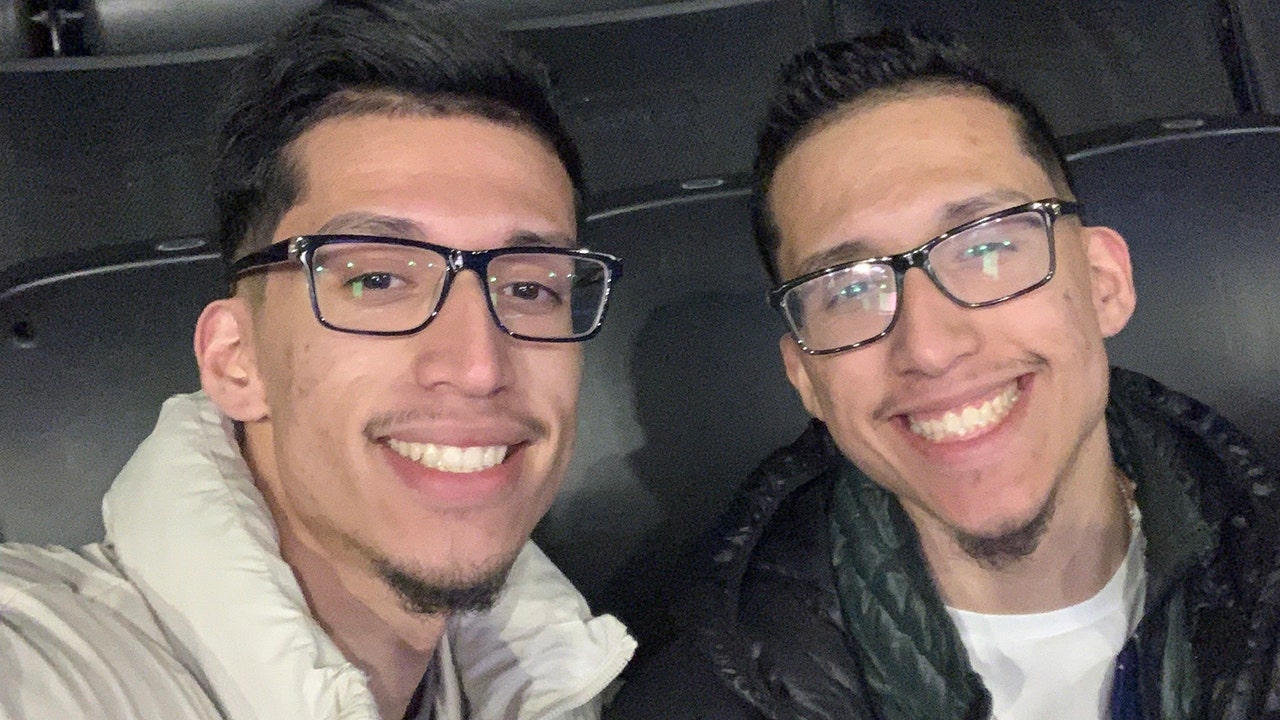The notion that twins do everything together has met a new standard.
Identical twin brothers Pablo and Julio Delcid, 21, underwent matching heart surgeries on the exact same day following their diagnosis of Marfan syndrome.
The duo, of Dover, New Jersey, had been alerted to their risk of Marfan syndrome because a majority of their family members also have it, the twins told Fox News Digital in an on-camera interview.
FOUR TEXAS RESIDENTS FOREVER CONNECTED BY TWO KIDNEY DONATIONS IN DIFFERENT CITIES: ‘SUPERBLY TIMED’
“We’re a family of five. I have two older sisters who have it,” Julio Delcid said. “My older brother doesn’t have it as much … But I also have other family members who have it, too — pretty much through my whole family on my mom’s side.”
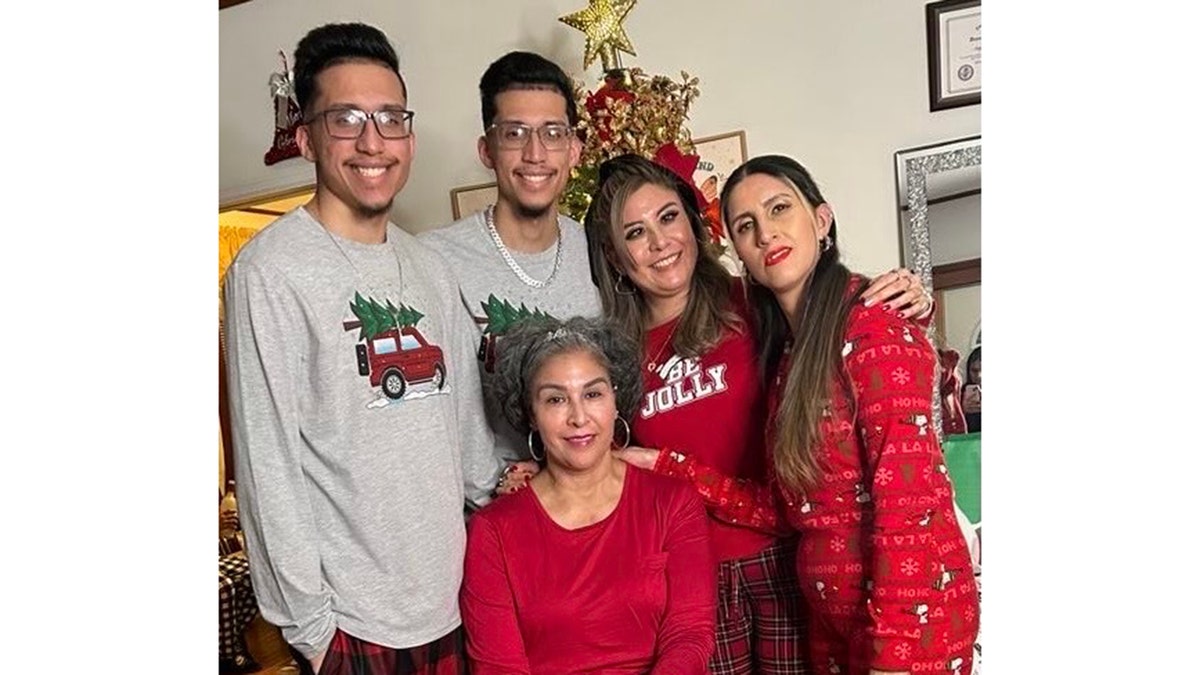
Left to right, Pablo Delcid and Julio Delcid celebrate Christmas with some of their family members. (Pablo and Julio Delcid)
“It’s very genetic,” Pablo Delcid added. “When we were younger and were first diagnosed with it, nobody knew what it was.”
He added, “Nobody knew they even had it until tests kept coming in, and they were like, ‘Yeah, it’s pretty genetic. Everyone should get tested.'”
What is Marfan syndrome?
Fox News Digital spoke with Dr. Benjamin Van Boxtel, surgical director at the Atlantic Aortic Center at Morristown Medical Center, in a separate interview about the condition; he performed the twins’ surgeries.
The cardiovascular surgeon said that while Marfan syndrome is mostly genetic, it can also occur at random. It’s a defect of the gene that creates connective tissues in the human body, he said.
FLORIDA STUDENT AND TEACHER BOND OVER MATCHING SCARS FROM THEIR OPEN-HEART SURGERIES: ‘TOUGH COOKIES’
“Because it’s a broad defect in these connective tissues, it can affect many different parts of the body,” he said. “So, this could be anywhere from the eyes to the spine and … the heart.”
“The most dangerous symptom you could develop with Marfan syndrome is a dilation of the aorta, specifically in the root,” he added.
Van Boxtel said the aortic root in Marfan syndrome can become dilated or enlarged, which can cause an “immediately fatal” tear or rupture.
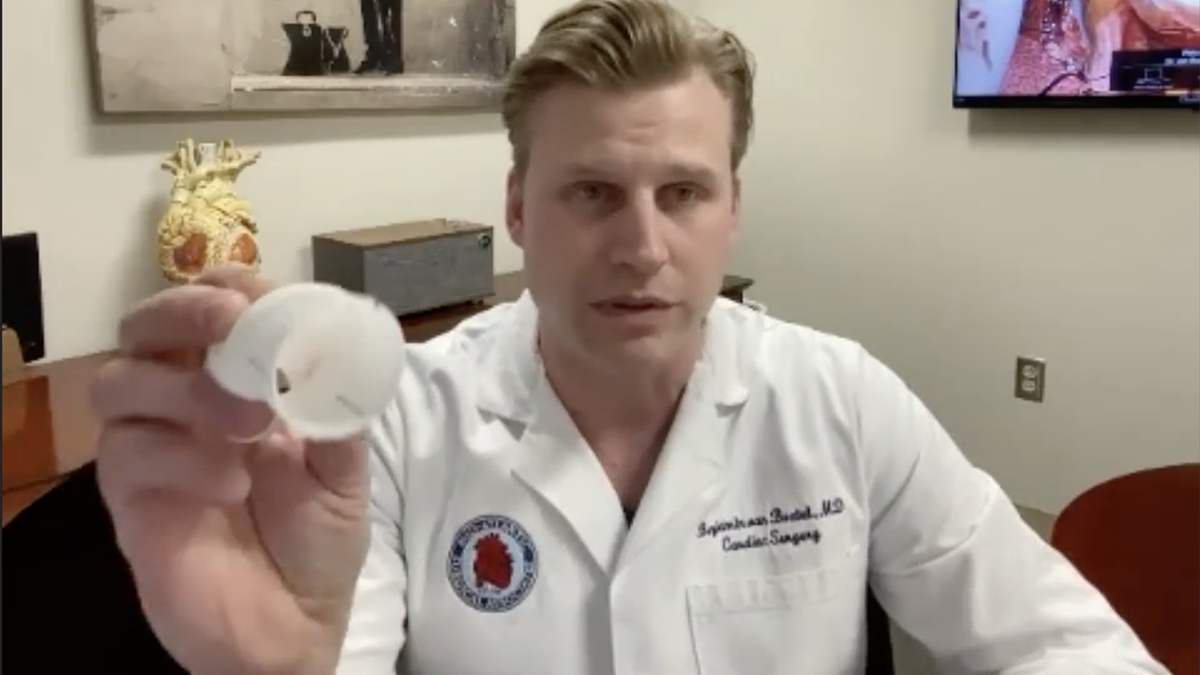
Van Boxtel holds up a “tube-shaped graft” model used during a valve sparing root operation, in which the surgeon “replaces the aortic root and then hand-sews leaflet by leaflet inside that graft.” (Angelica Stabile/Fox News Digital)
“Or it can cause something called an aortic dissection, which is also potentially very fatal, and becomes a surgical emergency,” he said. “That’s unfortunately how a lot of people who have Marfan syndrome pass away.”
Many of those people don’t even know they have the syndrome, Van Boxtel noted.
A valve-sparing root procedure performed before a dilated aorta dissects can be a life-saving operation.
TWO WOMEN WITH HEART DISEASE HAD TO FIGHT FOR A DIAGNOSIS. HERE’S HOW THEY ADVOCATED FOR THEIR HEALTH
Marfan syndrome can be difficult to spot, according to Van Boxtel, as it’s often marked by common symptoms such as chest pain, poor vision — or being tall and having long limbs.
“When you have an aneurysm [from a] dilated aorta, it’s generally asymptomatic, meaning you feel absolutely nothing,” he said. “You feel completely fine … Aneurysm disease is silent, it’s asymptomatic — which can be really dangerous.”
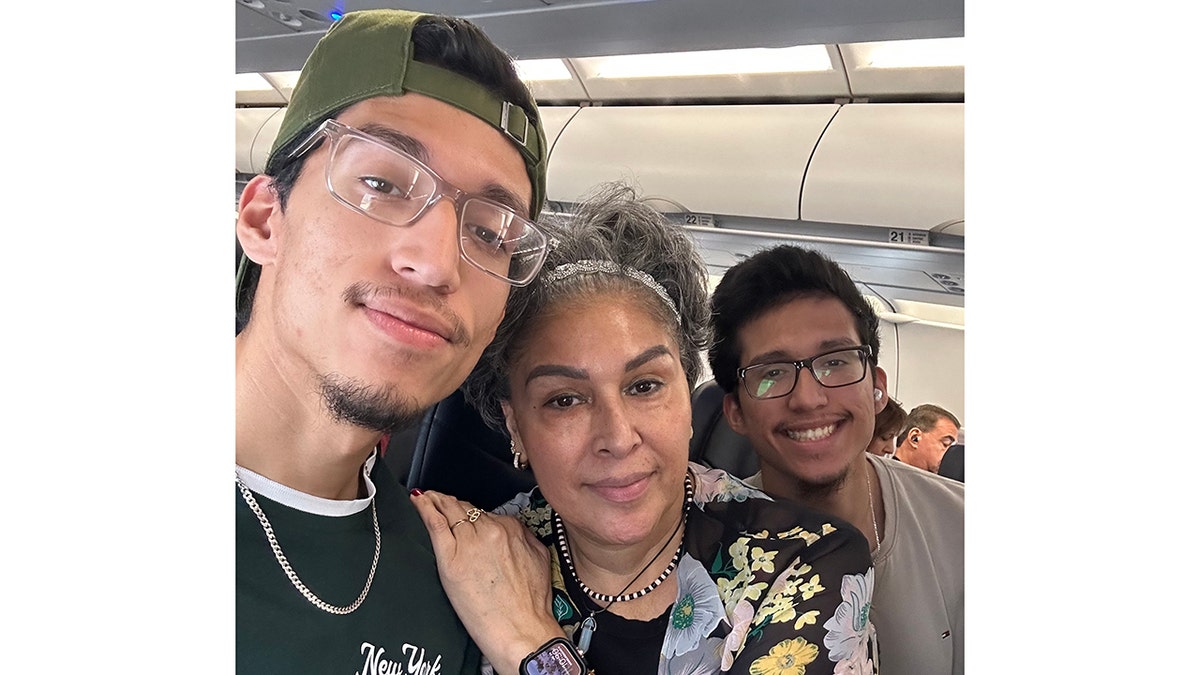
Left to right, Julio Delcid, the twins’ mother, Betulia Miranda, and Pablo Delcid snap a selfie. (Pablo and Julio Delcid)
Pablo Delcid, for his part, said there’s “not much you can feel when you’re growing into the condition.”
He added, “What we didn’t know was that our bodies were changing … obviously with height, vision, the length of our arms, feet, legs, even with our chest.”
Surgery on the same day
The twins’ mother, Betulia Miranda, had an emergency procedure on Oct. 8, 2023, after experiencing an aortic dissection, which the boys described as “excruciating” for her.
After their mother’s surgery was a success, the twins decided to seek preventative surgery performed by Dr. Van Boxtel – but their one request was that they do it together.
“Of course they’re like, ‘Can we go at the same time?’” the doctor said with a laugh.
FLORIDA BRAIN TUMOR PATIENT PLAYS GUITAR DURING HIS SURGERY: ‘THIS IS WILD’
Van Boxtel, a father of twins himself, said the double surgery was like “nothing I’ve ever done before.”
He said, “I’ve done this procedure hundreds of times. But to do it back-to-back on twin brothers — it was an experience, that’s for sure.”
It was decided that Pablo Delcid would go first, since he was born five minutes before his brother, followed by Julio Delcid several hours later.
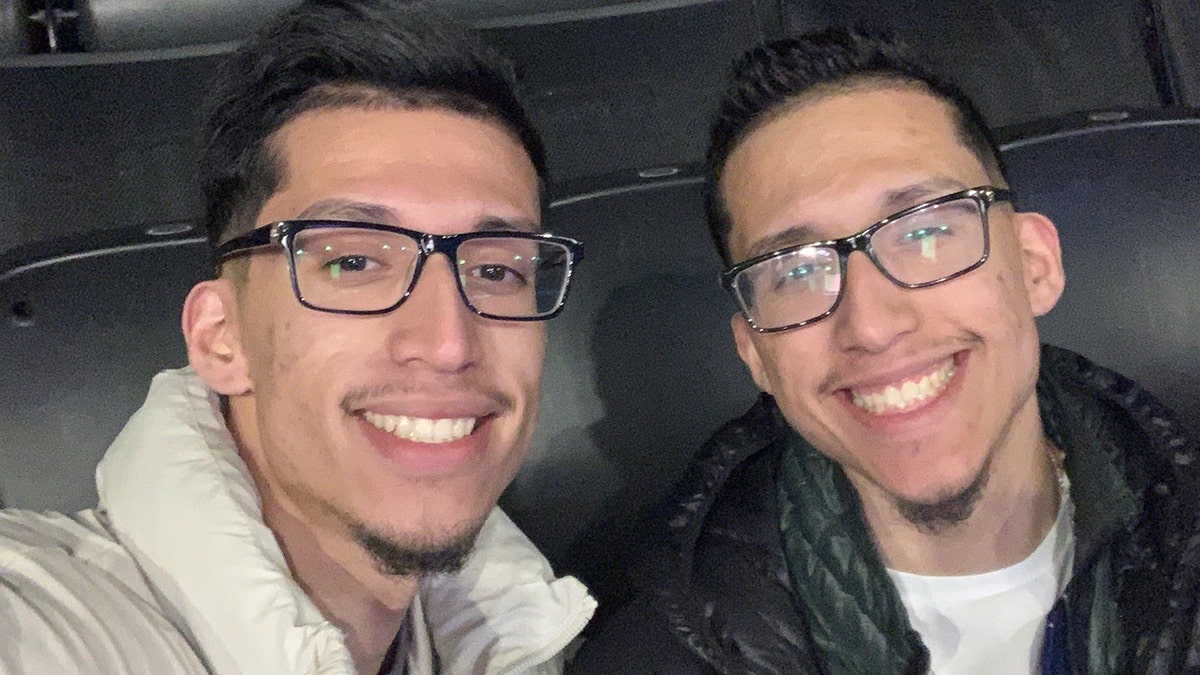
Julio Delcid, left, and Pablo Delcid underwent heart surgery on Jan. 5, 2024. (Pablo and Julio Delcid)
“We always do everything together,” Pablo Delcid said. “We live together, go through everything together … We didn’t think we could get the operation done together, but everything [was] successful.”
The twins agreed that they felt “safer” knowing they were going through the procedure together.
“You kind of feel like you’re not going to lose that person,” Julio Delcid said. “They’re sticking with you, side by side.”
“Aneurysm disease is silent, it’s asymptomatic — which can be really dangerous.”
Pablo Delcid added, “It’s like your gut’s telling you, ‘All right, if I make it, he’s going to make it.’”
On surgery day, Jan. 5, 2024, Van Boxtel and his team distinguished the twins from one another using color-coded ankle bracelets.
The surgeon emphasized the rarity of double heart surgery on twins, especially at such a young age of 21. “This is like the ultimate twin study,” he said.
Van Boxtel said it was “freaky” when he realized that the brothers’ hearts were also identical.
“I knew they could be different on the inside, but it ended up that they were the exact same,” he said.
Julio Delcid said he was “shocked” that a surgeon like Van Boxtel could take on both surgeries back to back.
“He did the best he could,” he said. “He successfully saved our aortic valves, replacing the aneurysm … We were very appreciative.”
More about Marfan
Marfan syndrome affects about one in 5,000 people, according to Van Boxtel, and impacts men and women equally.
“About 75% of those cases are genetic,” he said. “But about 25% of Marfan cases are actually not inherited. They’re not from a parent. They’re a spontaneous mutation.”
ONE FAMILY DONATES FOUR KIDNEYS TO SAVE A NEW YORK MAN’S LIFE: ‘DEFIED ALL ODDS’
Along with a dilated aortic root (enlarged aorta) or narrow dissection (tear in an artery), patients also run the risk of having a leaky valve, which can lead to heart failure symptoms like shortness of breath, chest pain, dizziness and inability to perform normal exertional activity, Van Boxtel said.
Since Marfan syndrome is often hard to spot on the surface, the Delcid twins emphasized the importance of getting tested, especially for those within the Latin and Hispanic communities.
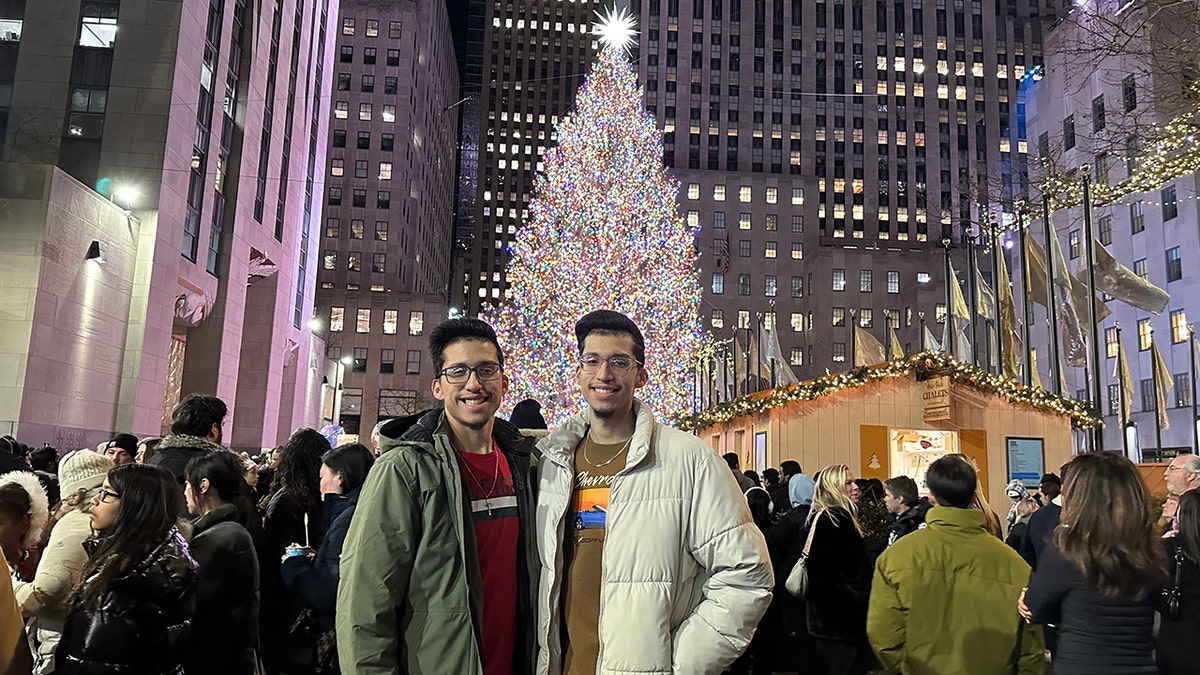
Julio Delcid said that those at risk of Marfan syndrome should “take the time to get yourself checked out.” (Pablo and Julio Delcid)
“It’s pretty lethal,” Pablo Delcid said. “We almost lost our mother, and that was a traumatic experience.”
People with symptoms or with a family history of Marfan syndrome should educate themselves on how best to prevent an aneurysm and connect with a cardiology team, Julio Delcid reiterated.
ARIZONA STUDENTS RAISE NEARLY $10K FOR HEART SURGERY FOR TEACHER’S WIFE: ‘MADE ME CRY’
“It’s just very important to take the time and the opportunity to get the best treatment that they could possibly get, because if they wait, consequences will happen later,” he said.
“Don’t fear anything. Just take the time to get yourself checked out and get the help that you need to live a better life.”
Looking ahead with new hope
With the stresses of heart surgery behind them, the twins said they’re looking forward to getting outside, playing sports and exercising more than they could before.
“Both their valves were saved,” Van Boxtel said. “They weren’t leaking at the end. All the things that we look for in a very successful repair they had, and they’re going to go on and live normal, healthy lives.”
“It’s a very serious problem … but there’s prevention available, and if you get it at the right time, it can be very successful.”
He said he hoped that “these valves last a really, really long time, if not the rest of their lives. They’re much better off now than they were walking around with aneurysms.”
CLICK HERE TO SIGN UP FOR OUR HEALTH NEWSLETTER
Van Boxtel thanked his team for handling the complex, same-day operations on young men with their “whole lives ahead of them.”
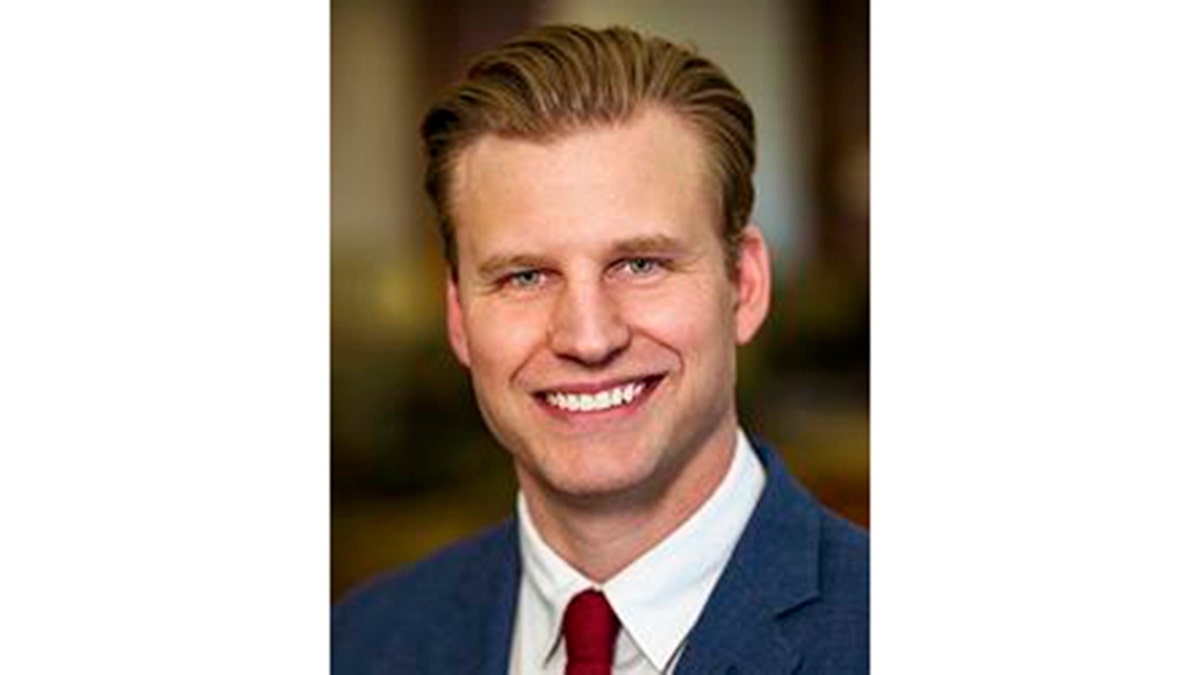
Dr. Benjamin Van Boxtel is a cardiovascular surgeon and the surgical director of the Atlantic Aortic Center at Morristown Medical Center. (Atlantic Health System)
The Marfan Foundation has various resources for patients at all stages of the condition, the doctor noted.
CLICK HERE TO GET THE FOX NEWS APP
“I can’t underscore how important it is for patients with aneurysms to be seen by a surgeon or a team who is comfortable performing that,” he said.
“It’s a very, very serious problem … but there’s prevention available, and if you get it at the right time, it can be very successful.”
For more Health articles, visit www.foxnews.com/health.

